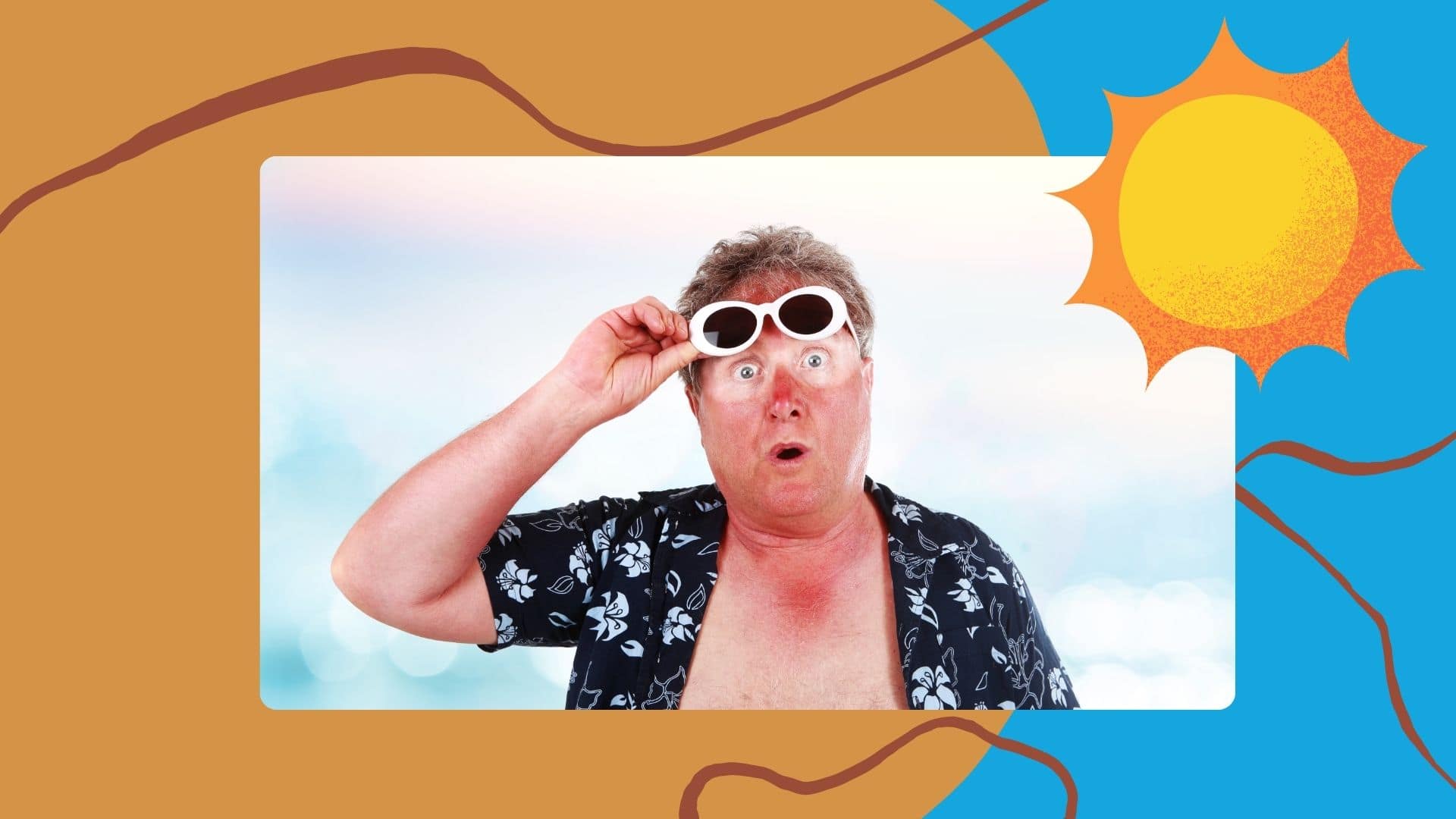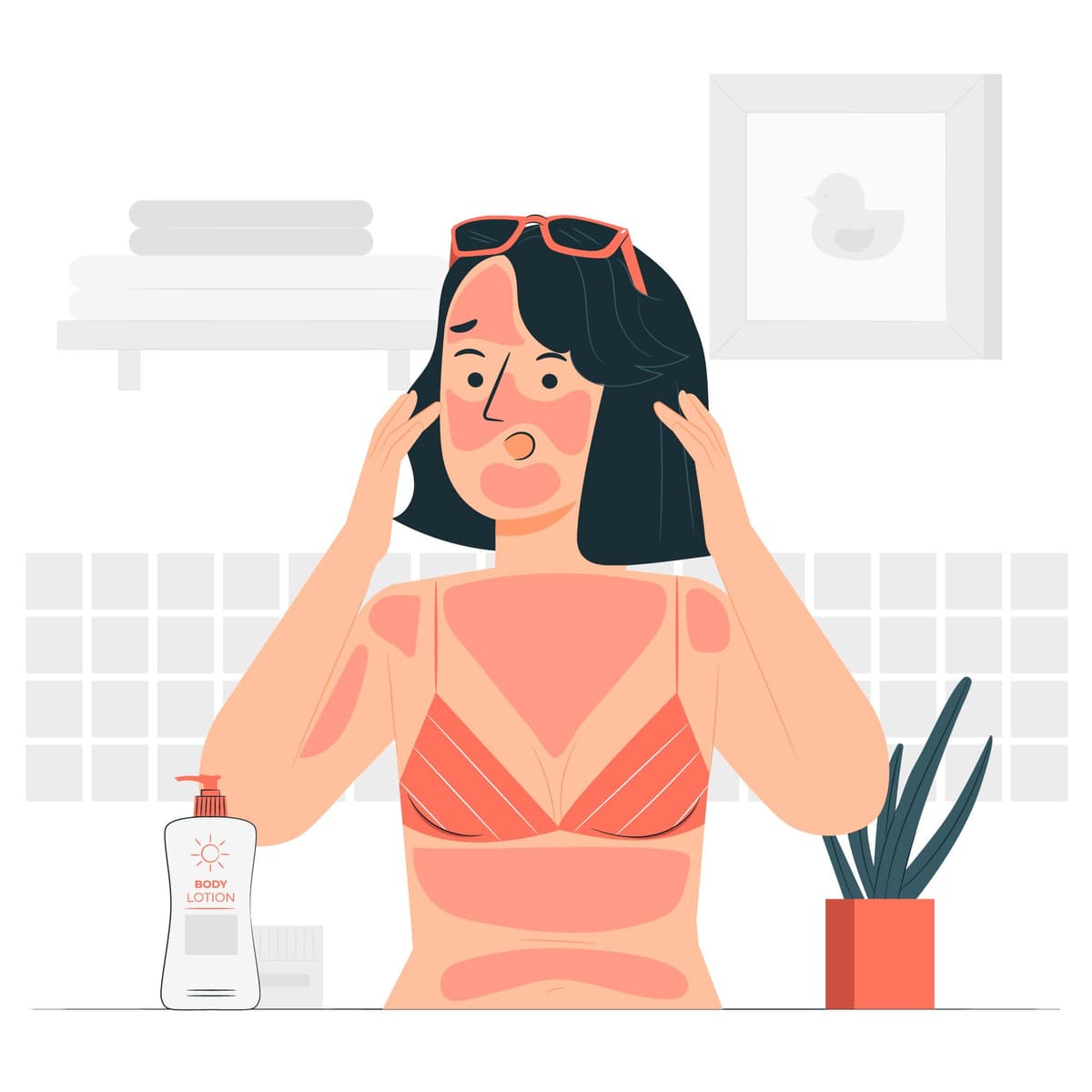
Ensuring sun safety for your family is crucial. While sun exposure is necessary for vitamin D production, unprotected exposure to ultraviolet (UV) rays can lead to serious damage to the skin (via sunburns), eyes, and immune system, increasing the risk of cancer. Tanning, a response to UV light, does not prevent skin cancer. Ultraviolet A (UVA) and ultraviolet B (UVB) rays pose different risks, with UVB being more closely associated with skin cancer and UVA contributing to aging effects like wrinkles and loss of elasticity. Proper sun protection, including sunscreen application, wearing protective clothing, seeking shade, and avoiding tanning beds, is essential for minimizing these risks (Smith 2020, Johns Hopkins Medicine).
In this post, we’ll explore the causes of sunburn, the risks, at-home treatments, and guidance on when to seek medical attention. Finally, we’ll cover some sun safety tips and explore the positive side of getting some sun.

Sunburn happens when skin is exposed to too much UV radiation from sunlight or artificial sources like tanning beds. UV radiation damages DNA in skin cells, which triggers inflammation as the body’s defense. This inflammatory reaction causes the typical redness, pain, and peeling linked with sunburn.
☀️ UV radiation: Even on overcast days, UV rays can penetrate clouds and adversely affect your skin, highlighting the importance of sun protection regardless of the weather conditions.
☀️ Reflections: Reflective surfaces can bounce UV rays back at you and double your exposure. This applies whether you’re on the slopes or by the pool.
Sunburn can have significant long-term repercussions on skin health. Prolonged or repeated sun exposure heightens the risk of skin cancer, notably melanoma, the most lethal form of skin cancer. Moreover, sunburn expedites skin aging, resulting in wrinkles, sagging, and age spots. It’s imperative to prioritize sun protection measures to protect yourself.
☀️ Skin cancer: That’s concerning! Sunburn can elevate your risk of skin cancer, including the frightening possibility of melanoma.
☀️Premature aging: Sunburn speeds aging, leaving you with unwanted wrinkles and sunspots.
You can use at-home remedies to ease discomfort and aid healing for mild sunburns that don’t need medical attention. Applying aloe vera gel to the affected area soothes inflammation and eases pain. Cool showers or cold compresses can also provide relief by constricting blood vessels and reducing swelling.
☀️ Aloe to the rescue: Ah, the green stuff. Slather on some aloe vera gel for instant relief. Brands like Banana Boat and Fruit of the Earth have your back (or your burn).
☀️ Cool showers: Skip the hot tub and use a refreshing cold shower instead. Your skin will thank you.
Now that we’ve covered what causes sunburn and why it’s harmful, go through this guide to decide if you need medical attention.
While most sunburns can be managed at home with self-care measures, there are instances where medical attention is necessary. Symptoms of severe sunburn include blistering, severe pain, fever, chills, and nausea. If you experience any of these symptoms, seeking medical help is crucial.
According to Northwestern Medicine’s HealthBeat, you should seek medical attention for your sunburn if you experience symptoms like a skin infection, severe pain, prolonged fever, or nausea. These could be signs of a more serious complication that requires medical evaluation and treatment.
In severe cases where large areas of the body are affected, a healthcare provider may recommend corticosteroid cream or a short course of oral corticosteroids like prednisone to reduce inflammation and pain. Corticosteroids work by suppressing the body’s immune response and reducing swelling. Antibiotics are generally not required unless a secondary bacterial infection develops.
☀️ Prescription power: Sometimes, over-the-counter remedies just won’t cut it. Doctors might prescribe a corticosteroid cream or a short stint of prednisone to calm the inflammation and soothe the burn.

Remember, prevention is always better than cure when it comes to sunburn. Protect your skin by wearing sunscreen, seeking shade during peak sun hours, and wearing protective clothing. By being proactive about sun safety, you can enjoy the sun’s benefits while minimizing the risk of sunburn and long-term skin damage.
Okay, now that we’ve got the sun protection talk out of the way, let’s talk about the bright side—literally: how soaking up some rays can be seriously good for us.
Armed with the following carefully selected sunburn survival tips, you’re ready to tackle any sunny adventure with your skin. Don’t forget to apply sunscreen generously, put on your shades, and bask in the sunshine responsibly! Stay safe, absorb those rays, and keep shining!
The benefits
☀️ Vitamin D boost: Did you know you need vitamin D for strong bones and a tough immune system? Well, the sun’s got your back on that one. Just soak up those rays for a natural dose.
☀️ Mood enhancement: Feeling a bit down? Sunlight has a way of lifting your spirits by giving your brain a serotonin boost. Soak it in and feel the good vibes.
☀️ Improved sleep quality: Ready to upgrade your sleep game? Taking in some sunshine during the day helps fine-tune your body’s internal clock, preparing you for a night of deep, rejuvenating sleep.
In conclusion, prioritizing sun safety for your family is essential. Understanding the risks associated with sun exposure and adopting preventive measures such as applying sunscreen, wearing protective clothing, and seeking shade can significantly reduce the risk of skin cancer and premature aging. By sharing this crucial information with friends and family, you can collectively ensure the long-term health and well-being of your loved ones. It’s important to note that when you’re informed and prepared, you can still enjoy the benefits of sun exposure while minimizing its potential harm (Smith, 2020, Johns Hopkins Medicine).
Reference: Smith, J. (2020). “The Dangers of Sun Exposure.” Retrieved from https://www.hopkinsmedicine.org/health/wellness-and-prevention/sun-safety